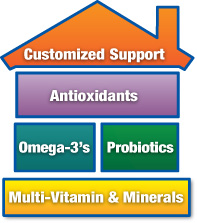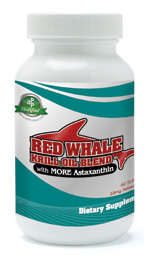
Your Body could be as Unstable as Our Economy!
If your relationship with the word “fat” is anything like mine, you are probably accustomed to those immediate feels of disgust, shame and sudden urges to take a jog around the block. This is normal folks, yet relatively ill advised.
Historically speaking, dietary fats have garnered a bad reputation for being the “black sheep” of all nutrients. They are all too often cast out of our diets due to the belief that they are generally unhealthy and at best, a good source of energy. While the truths of these beliefs may not be entirely misguided, it is important to note that not all fats are created equal. In fact, some dietary fats are actually quite good for you and even necessary for optimal health.
The Discovery of Polyunsaturated Fatty Acids
In an effort to settle the debate as to whether dietary fats are beneficial or even necessary for proper growth and development, George and Mildred Burr (1929) conducted a study looking into the beneficial effects of a fat free diet on a young colony of rats. Their findings were quite shocking and contrary to what most would expect. Although the young rats did lose weight, they were all found to have contracted diseases and later died.
On the up the side, these findings did lead to the discovery of a class of fatty acids (polyunsaturated fatty acids) that were found to be essential for optimal health, yet could not be produced within the body alone. Meaning… we need to include these fats in our diet to sustain normal growth and development.
Essential Polyunsaturated Fatty Acids
There are two classes of essential polyunsaturated fatty acids: Omega-3s and Omega-6s; Omega-5, -7, and -9’s are non-essential.
Omega-6 Fatty Acids
Originating in the seeds of plants, these fatty acids can be found in corn, safflower, soybean, sunflower, and cottonseed oil, as well as in plant-based oils (e.g., evening primrose, blackcurrant seed oil, borage oil, hemp seed oil, oats, barley, spirulina.) and animal-based foods (meat, eggs, dairy products).
Omega-6 has been found to play a key role in:
- Normal growth and development
- Cognitive functioning
- Stimulation of hair growth
- Maintaining bone mass
- Regulating metabolism
- Maintaining the reproductive system
As great as these benefits may seem, these fatty acids can also come at a cost when they are not properly balanced with Omega-3s. In the process of breaking down Omega-6 fatty acids (comprised of linoleic, gamma-linolenic, dihomo-gamma-linolenic, and arachidonic acids), our body produces molecules (eicosanoids, prostaglandin E2, leukotriene), that in excess, can encourage blood clotting, inflammation in the body and suppression of the immune system leaving us more vulnerable to infection. Omega-3 fatty acids, on the other hand, can help counteract these detrimental effects when properly balanced with Omega-6s. Yet, the average American diet tends to consist of 14 to 25 times more Omega-6s than Omega-3s! In fact, research has shown that diets high in Omega-6 fatty acids (low in Omega-3s), has led to increased rates of:
- Cardiovascular diseases
- Inflammatory diseases
- Obesity
- Cancer
- Psychiatric conditions (Depression, Bipolar Disorder, Autism, Alzheimer’s)
Omega-3 Fatty Acids
Though predominately found in fish (in the forms of eicosapentaenoic/EPA & docosahexaenoic/DHA acids; salmon, albacore/blue fin tuna, halibut, trout, sardines, mackerel, and herring), these polyunsaturated fatty acids can also be found in the leaves and seeds of certain plants (in the form of alpha-linolenic acid/ALA; flaxseeds, walnuts, hempseeds, soybeans, some dark green leafy vegetables).
Dating back to the early 1970’s, researchers have found reason to believe that Omega-3 fatty acids serve the ultimate Yin function in warding off the autoimmune response and inflammation in the body, while lowering the risk of chronic diseases (e.g., heart disease, cancer, arthritis, diabetes, hypertension). In addition, Omega-3s enhance blood flow and cognitive/behavioral functioning (e.g., benefitting children with learning disabilities, reducing violence in prison inmates, enhancing mood and preventing neurological disorders).
Omega-3’s Heart Health Benefits:
Ever wonder why North Americans tend to fall victim to higher rates of cardiovascular disease than others around the world? Scientists have found that diets high in Omega 3 fatty acids, such as the Mediterranean diet, can help protect us against stroke and atherosclerosis (hardening of the arteries) triggered by plague buildup and blood clots in the arteries. The Mediterranean diet does not include large amounts of meat, which are high in Omega-6 fatty acids. Rather, this diet promotes foods rich in Omega-3’s, such as whole grains, fresh fruits and veggies, fish, olive oil, garlic, and moderate amounts of red wine.
Research has shown that the two Omega-3 fatty acids found in fish, EPA and DHA, can actually help reduce our chances of developing heart disease by lowering our cholesterol, heart rate, blood pressure and triglycerides. The American Heart Association recommends that healthy adults eat at least 2 servings per week of EPA and DHA-rich foods or take an Omega-3 supplement, like krill oil.
Psychological Benefits of Omega-3 Fatty Acids:
The human brain is rich in polyunsaturated fatty acids, especially DHA (an Omega-3 fatty acid). The concentration of DHA in the brain rises slowly but steadily during fetal development and the first few years of life, proving the importance of Omega-3’s in maintaining proper membrane structure and functioning of the brain. Not only have Omega-3 fatty acids been found to improve cognitive functioning, they have also been found to prevent dementia. More specifically, studies have shown that patients taking Omega-3’s reported improved abilities to mentally respond and learn with fewer errors. Another study conducted by Morris and colleagues found that adults with a higher dietary intake of DHA had a 60 to 70 percent reduction in their risk of developing Alzheimer’s Disease.
If that’s not enough to convince you, Omega-3 deficiencies have been associated with an inability to combat stress appropriately— often leading to adjustment disorders, major depressive disorders, episodes of impulsive violence, and even suicide.
Luckily, studies have proven that Omega-3 supplements can be used to correct these types of problems. Researchers have found that patients who were given a dose of 2.0 grams per day of Omega-3’s reported reduced stress and depression, and had a decrease in suicidal thinking. Trials involving Omega-3’s have also found that these supplements can reduce symptoms of anxiety.
Meta-analytic studies have also shown that Omega-3’s are in fact more effective than many of the antidepressant medications on the market.
How to Maintain Your Yin and Yang:
Increase your Intake of Omega-3’s!
Research shows that the optimal Omega-6 to Omega-3 ratio should be in the range of 1:1, 1:2, or 1:3. In response to the treatment of medical conditions related to Omega-3 deficiencies, larger ratios may be necessary, such as 1:4 for flaxseed oil and 1:15 or 1:12 for krill and fish oils. Krill oil has been found to be one of the best sources of Omega-3 fatty acids. It’s phospholipid structure makes it easier for the body to absorb, while holding as much as 50 times the antioxidant power than fish oils.
Take Home Message:
- Not all fats are bad—Polyunsaturated fatty acids are actually considered to be essential for normal growth and development.
- There are two types of Essential Polyunsaturated fatty acids: Omega 3s and Omega 6s— Omega 5, 7, and 9s are non-essential.
- Omega 6 fatty acids are good for us, yet quite damaging to our bodies when in excess.
- Omega 3 fatty acids help counterbalance these detrimental effects that Omega 6s can cause.
- The optimal Omega-6 to Omega-3 ratio should be in the range of 1:1, 1:2, or 1:3—yet, the average American diet tends to consist of 14 to 25 times more Omega-6s than Omega-3s.
- Omega 3s can help maintain a healthy heart, mind and body.
- Krill oil has been found to be the best source of Omega 3s.
Additional Resources:
The Vanishing Youth Nutrient (Included in this article: Three Easy Ways to Increase Omega-3s & 10 Easy Ways to Reduce Omega-6s):
http://www.prevention.com/node/23829
Rag-Tag Research Geek Recommendations
 All of the many health benefits mentioned above are the main reason Omega-3’s are in the ground floor of our Blueprint For Health.
All of the many health benefits mentioned above are the main reason Omega-3’s are in the ground floor of our Blueprint For Health.
Much like the kitchen and bathroom are two of the most important rooms in your home, these are among the most crucial supplements to add to your routine.
Specifically, we recommend:
This is one of our favorite products in all the supplement world!
- Contains the highest amounts of EPA and DHA (the Omega-3’s found to be the most effective against inflammation) of any krill oil on the market
- More astaxanthin (the anti-inflammatory antioxidant powerhouse) than any other krill oil available
Where To Find It:



well i know i bothered you a lot but this is my last question , i have now green coffee bean and starting use it few days ago but i did.t observe any change in my appetite i,m still crave for food but the good thing is i observed i have lot of energy , do you think its matter of time then my appetite will be decreased for food or what i,m concerned about that , many thanks
I have recently started taking Kriaxanthin along with
Dr. Sinatra’s Omega Q Plus. Should I discontinue the Omega Q Plus? What do you think about the comparison of the two and also
the quality in Vitacost’s 1000mg Krill> Gigismama
Hey, great to hear from you. Well it looks like the Omega Q Plus has CoenzymeQ10, added B vitamins, L-carnitine, and higher levels of the Omega-3 fatty acids but it costs more. It uses squid oil instead of krill oil, squid oil is a pretty new supplement, I wasn’t able to find much research on it. The Omega Q Plus doesn’t have astaxanthin, so I guess whether or not you continue to use it should depend on your budget and what you’re looking for most in a supplement- the Kriaxanthin probably has more antioxidants overall, while the Omega Q Plus is more focused on heart health.
I would like to know which of your supplements help to lower cholesterol
Hi Mary! Red ___ Krill Oil will, like most Omega-3 supplements, been shown to support cardio healthmay. I hope that helps.